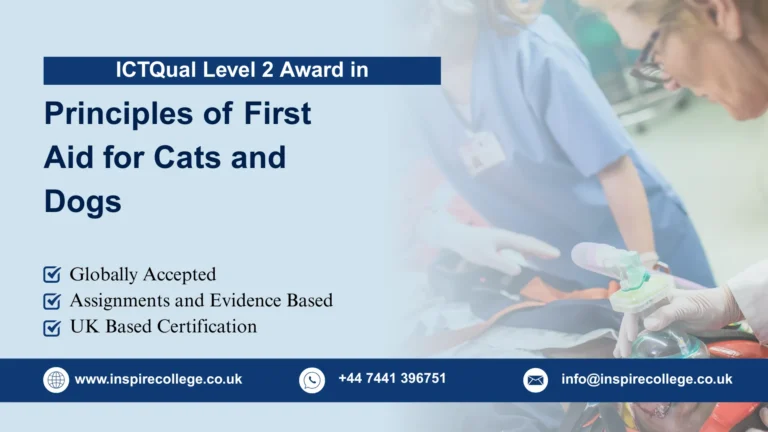
ICTQual ABDiploma in Occupational Health and Safety Engineering 360 Credits- Three Years
The ICTQual AB Diploma in Occupational Health and Safety Engineering (360 Credits – Three Years) is a globally recognized qualification designed to equip learners with advanced knowledge, practical skills, and strategic expertise in workplace safety, risk management, and occupational health. In today’s industries, ensuring the safety and well-being of employees is critical, making this diploma highly relevant for professionals, fresh graduates, and international learners seeking to excel in health and safety roles.
This Level 6 international diploma in occupational health and safety engineering provides comprehensive coverage of key areas including risk assessment, hazard identification, safety management systems, emergency preparedness, fire safety, environmental protection, and ergonomics. The course is fully assignment-based, allowing learners to study at their own pace from anywhere in the world, making it ideal for working professionals and international candidates seeking flexibility without compromising on quality or recognition.
Learners will develop practical competencies in conducting safety audits, implementing workplace safety policies, managing hazards, and ensuring compliance with national and international safety regulations. The diploma also focuses on leadership, analytical thinking, and decision-making skills, preparing graduates to manage teams, advise organizations, and drive strategic safety initiatives effectively.
This qualification is British Council verifiable, MOFA and Embassy attested, providing international credibility and recognition for career advancement, employment, and iqama approval in Gulf countries. Experienced professionals with relevant work experience can fast-track the certification by demonstrating expertise and participating in professional discussion assessments, while fresh students gain hands-on knowledge through 36 mandatory assignments completed within three years.
By completing the ICTQual AB Diploma in Occupational Health and Safety Engineering, learners become competent, globally recognized professionals capable of enhancing workplace safety, improving operational efficiency, and advancing their careers in oil and gas, construction, manufacturing, healthcare, and other high-risk industries.
The ICTQual AB Diploma in Occupational Health and Safety Engineering is designed for learners who are eager to develop advanced skills in workplace safety, risk management, occupational health, and safety leadership. To ensure that learners are fully prepared to benefit from this comprehensive program, the following entry requirements apply:
Age Requirements
- Applicants must be at least 18 years old at the time of enrolment.
- Ensures learners are mature enough to engage with professional health and safety content.
Educational Requirements
- Minimum of a high school diploma or equivalent qualification.
- Prior study in science, engineering, health, or safety-related subjects is recommended but not mandatory.
Professional Experience
- Fresh candidates may enrol without prior work experience and are required to complete all 36 mandatory assignments within three years.
- Experienced professionals with at least six years of relevant occupational health and safety experience can fast-track certification through prior learning recognition and professional discussion assessments.
English Language Proficiency
- Applicants must demonstrate proficiency in English through academic qualifications or recognized language tests.
- Ensures learners can fully understand course materials, participate in assessments, and complete assignments effectively.
Additional Requirements
- Commitment to adhere to deadlines and actively engage with all learning materials and assessments.
- Access to a computer and reliable internet connection for remote study and assignment submission.
By meeting these entry requirements, learners are well-prepared to engage with advanced occupational health and safety concepts, practical projects, and professional applications throughout the three-year, 360-credit program, ensuring a successful learning experience and career advancement in occupational health and safety engineering.
Mandatory Units
This qualification, the ICTQual AB Diploma in Occupational Health and Safety Engineering 360 Credits- Three Years, consists of 36 mandatory units.
Year 1 – Foundation Level
- Introduction to Occupational Health and Safety
- Principles of Risk Assessment and Management
- Workplace Safety Legislation and Compliance
- Fundamentals of Fire Safety Management
- Personal Protective Equipment (PPE) in the Workplace
- Environmental Health and Safety Awareness
- Accident Investigation and Reporting Procedures
- Ergonomics and Human Factors in Safety
- Health and Safety Communication Skills
- Hazard Identification and Control Measures
- Basics of Industrial Hygiene
- Introduction to Emergency Preparedness and Response
Year 2 – Intermediate Level
- Advanced Risk Assessment Techniques
- Fire Safety Systems and Evacuation Planning
- Safety Management Systems (ISO 45001)
- Workplace Safety Auditing and Inspection
- Electrical Safety in the Workplace
- Mechanical and Machinery Safety
- Environmental Protection and Sustainability Practices
- Occupational Health Monitoring and Surveillance
- Safety Leadership and Team Management
- Hazardous Materials and Chemical Safety
- Noise, Vibration, and Occupational Stress Management
- Construction and Industrial Safety Practices
Year 3 – Advanced Level
- Strategic Health and Safety Management
- Advanced Fire Risk Management and Prevention
- Safety Culture Development and Behavioural Safety
- Advanced Accident Investigation and Root Cause Analysis
- Ergonomic Risk Management in Industrial Settings
- Emergency Planning and Crisis Management
- Safety Performance Metrics and KPI Analysis
- Legal Compliance and Occupational Safety Standards
- Environmental Health and Safety Policy Development
- Health and Safety Project Planning and Implementation
- Leadership in Occupational Safety Engineering
- Capstone Project in Occupational Health and Safety Engineering
The ICTQual AB Diploma in Occupational Health and Safety Engineering is designed to equip learners with comprehensive knowledge, practical skills, and strategic expertise in workplace safety, risk management, and occupational health. Throughout this three-year, 360-credit program, learners will gain the capabilities to assess, manage, and improve safety standards across diverse industries, ensuring compliance with national and international regulations.
Year 1 – Foundation Level
Introduction to Occupational Health and Safety
- Understand core principles and objectives of occupational health and safety.
- Identify workplace hazards and basic preventive measures.
- Apply foundational safety procedures to maintain a secure work environment.
- Develop awareness of health and safety responsibilities in organizations.
Principles of Risk Assessment and Management
- Conduct basic risk assessments using standardized frameworks.
- Identify, evaluate, and prioritize workplace hazards.
- Implement control measures to minimize risk.
- Understand the hierarchy of risk control strategies.
Workplace Safety Legislation and Compliance
- Understand national and international health and safety laws.
- Apply compliance requirements in workplace scenarios.
- Develop documentation for legal and regulatory adherence.
- Recognize employer and employee responsibilities under legislation.
Fundamentals of Fire Safety Management
- Identify fire hazards and understand fire behavior.
- Learn fire prevention techniques and emergency protocols.
- Understand fire detection and suppression systems.
- Develop basic fire emergency response plans.
Personal Protective Equipment (PPE) in the Workplace
- Identify types of PPE for different workplace hazards.
- Learn proper usage, maintenance, and storage of PPE.
- Assess PPE effectiveness in workplace safety scenarios.
- Develop PPE compliance procedures for employees.
Environmental Health and Safety Awareness
- Understand the environmental impact of workplace activities.
- Implement eco-friendly safety practices and sustainability measures.
- Promote awareness of environmental regulations in the workplace.
- Integrate environmental considerations into safety planning.
Accident Investigation and Reporting Procedures
- Identify causes and contributing factors of workplace accidents.
- Learn techniques for incident investigation and data collection.
- Prepare accurate accident reports and documentation.
- Recommend corrective actions to prevent recurrence.
Ergonomics and Human Factors in Safety
- Understand ergonomic principles and their impact on safety.
- Identify musculoskeletal risks and preventive measures.
- Apply human factor analysis to improve workplace safety.
- Promote ergonomic interventions in industrial and office environments.
Health and Safety Communication Skills
- Develop effective communication strategies for safety messages.
- Conduct safety briefings and training sessions.
- Promote a culture of open safety communication.
- Document and report safety information accurately.
Hazard Identification and Control Measures
- Identify physical, chemical, biological, and psychosocial hazards.
- Apply control measures to reduce risk exposure.
- Monitor and evaluate hazard control effectiveness.
- Integrate hazard identification into routine safety practices.
Basics of Industrial Hygiene
- Understand occupational exposure limits and monitoring methods.
- Learn techniques to reduce employee exposure to hazards.
- Implement workplace hygiene practices.
- Promote health protection strategies in industrial environments.
Introduction to Emergency Preparedness and Response
- Develop emergency response plans for various scenarios.
- Learn evacuation procedures and crisis management basics.
- Conduct drills and readiness assessments.
- Coordinate emergency communication and resources.
Year 2 – Intermediate Level
Advanced Risk Assessment Techniques
- Apply quantitative and qualitative risk assessment methods.
- Analyze complex hazards and develop mitigation strategies.
- Implement comprehensive risk management plans.
- Evaluate the effectiveness of risk control measures.
Fire Safety Systems and Evacuation Planning
- Understand advanced fire detection and suppression systems.
- Develop and implement evacuation strategies.
- Conduct fire risk assessments and emergency simulations.
- Ensure compliance with fire safety regulations.
Safety Management Systems (ISO 45001)
- Implement ISO 45001-compliant safety systems.
- Conduct internal audits and continuous improvement activities.
- Develop safety documentation and procedures.
- Align safety systems with organizational goals.
Workplace Safety Auditing and Inspection
- Perform detailed safety inspections and audits.
- Identify non-compliance and recommend corrective actions.
- Prepare comprehensive audit reports.
- Monitor effectiveness of implemented safety measures.
Electrical Safety in the Workplace
- Identify electrical hazards and risk factors.
- Implement safe work practices for electrical operations.
- Apply lockout/tagout procedures and emergency measures.
- Promote electrical safety awareness among staff.
Mechanical and Machinery Safety
- Ensure safe operation of machinery and equipment.
- Implement guarding, maintenance, and safety protocols.
- Conduct machinery-specific risk assessments.
- Train operators on safe machinery practices.
Environmental Protection and Sustainability Practices
- Apply workplace strategies to reduce environmental impact.
- Promote sustainable occupational health and safety practices.
- Monitor environmental compliance.
- Integrate environmental awareness into organizational culture.
Occupational Health Monitoring and Surveillance
- Conduct health monitoring programs for employees.
- Identify occupational illnesses and work-related conditions.
- Implement early intervention strategies.
- Analyze health data to improve workplace safety programs.
Safety Leadership and Team Management
- Develop leadership skills for managing safety teams.
- Foster proactive safety culture within organizations.
- Motivate and mentor employees in safety compliance.
- Coordinate safety initiatives across departments.
Hazardous Materials and Chemical Safety
- Identify and classify hazardous substances.
- Implement safe handling, storage, and disposal procedures.
- Conduct chemical risk assessments and exposure control.
- Develop emergency response plans for chemical incidents.
Noise, Vibration, and Occupational Stress Management
- Assess workplace noise and vibration hazards.
- Implement mitigation measures to reduce exposure.
- Identify and manage occupational stress factors.
- Promote overall employee well-being and health.
Construction and Industrial Safety Practices
- Apply safety principles in construction and industrial settings.
- Identify hazards specific to construction sites and heavy industry.
- Develop safety plans for projects and operations.
- Ensure compliance with industry-specific regulations.
Year 3 – Advanced Level
Strategic Health and Safety Management
- Develop organizational strategies for health and safety.
- Integrate safety planning into corporate objectives.
- Evaluate long-term safety performance and outcomes.
- Lead strategic initiatives to improve workplace safety culture.
Advanced Fire Risk Management and Prevention
- Conduct detailed fire risk assessments.
- Implement advanced fire prevention techniques.
- Plan and simulate emergency fire scenarios.
- Ensure organizational compliance with fire legislation.
Safety Culture Development and Behavioural Safety
- Promote behavioral safety practices among employees.
- Analyze factors influencing safety culture.
- Implement programs to enhance proactive safety engagement.
- Measure effectiveness of safety culture initiatives.
Advanced Accident Investigation and Root Cause Analysis
- Conduct thorough investigations of complex incidents.
- Apply root cause analysis to prevent recurrence.
- Prepare comprehensive investigation reports.
- Recommend corrective and preventive measures.
Ergonomic Risk Management in Industrial Settings
- Assess ergonomic risks in industrial environments.
- Design interventions to improve worker safety and comfort.
- Monitor effectiveness of ergonomic programs.
- Reduce musculoskeletal injuries and improve productivity.
Emergency Planning and Crisis Management
- Develop advanced emergency response plans.
- Coordinate crisis management teams and procedures.
- Conduct simulations and readiness assessments.
- Ensure operational continuity during emergencies.
Safety Performance Metrics and KPI Analysis
- Define key performance indicators for health and safety.
- Analyze safety performance data to guide improvements.
- Benchmark against industry standards.
- Report findings to senior management and stakeholders.
Legal Compliance and Occupational Safety Standards
- Ensure compliance with national and international safety regulations.
- Understand regulatory frameworks across industries.
- Implement compliance monitoring systems.
- Advise organizations on legal safety obligations.
Environmental Health and Safety Policy Development
- Develop comprehensive EHS policies and procedures.
- Integrate sustainability and safety goals into organizational policies.
- Communicate policies effectively to employees and stakeholders.
- Review and update policies for continuous improvement.
Health and Safety Project Planning and Implementation
- Plan and manage health and safety projects end-to-end.
- Coordinate resources, budgets, and timelines effectively.
- Apply project management techniques to safety initiatives.
- Evaluate project outcomes and impact on workplace safety.
Leadership in Occupational Safety Engineering
- Develop advanced leadership and management skills.
- Mentor teams and promote a culture of continuous improvement.
- Lead organizational change initiatives focused on safety.
- Influence strategic decisions to prioritize safety outcomes.
Capstone Project in Occupational Health and Safety Engineering
- Conduct a comprehensive, real-world occupational health and safety project.
- Apply theoretical knowledge and practical skills gained throughout the course.
- Analyze complex workplace safety challenges and develop solutions.
- Present findings and recommendations to a panel of assessors.
By completing this diploma, learners will be fully prepared to implement effective health and safety strategies, lead organizational safety initiatives, and pursue advanced careers in occupational health and safety engineering. Graduates will possess globally recognized skills, practical expertise, and leadership competencies necessary to enhance workplace safety, ensure regulatory compliance, and contribute to sustainable industrial practices worldwide.
The ICTQual AB Diploma in Occupational Health and Safety Engineering (360 Credits – Three Years) is designed to empower learners with globally recognized skills and expertise to excel in occupational health, workplace safety, and risk management. This diploma provides practical knowledge, strategic leadership capabilities, and international accreditation to advance careers across diverse industries.
Enhanced Career Opportunities
- Opens pathways to roles in oil and gas, construction, manufacturing, healthcare, and other safety-critical sectors.
- Improves professional credibility for leadership positions in safety management, compliance, and consultancy.
Global Recognition and Credibility
- British Council verifiable, MOFA and Embassy attested, ensuring worldwide acceptance.
- Recognized for career advancement, employment opportunities, and iqama approval in Gulf countries.
Comprehensive Knowledge and Skills
- Develop practical competencies in risk assessment, hazard identification, accident investigation, emergency planning, and safety audits.
- Gain expertise in occupational health, fire safety, ergonomics, and environmental protection aligned with international standards.
Flexible and Self-Paced Learning
- Fully assignment-based program allowing learners to study at their own pace from anywhere in the world.
- Experienced professionals can fast-track the diploma by demonstrating relevant work experience and participating in professional discussion assessments.
Leadership and Strategic Competence
- Build leadership, decision-making, and team management skills for senior safety roles.
- Gain the ability to develop and implement organizational safety strategies and policies.
Completing this diploma equips learners with the knowledge, practical experience, and internationally recognized credentials needed to lead occupational health and safety initiatives, enhance workplace safety, and advance their careers globally.
We are an approved centre of ICTQual AB, and learners must enrol with us to pursue the Diploma in Occupational Health and Safety Engineering (360 Credits – Three Years).
Route for Experienced Professionals
- Learners with at least 6 years of verifiable occupational health and safety or related industrial experience can apply for the experiential route.
- Submit a detailed professional portfolio demonstrating relevant health and safety projects, risk assessments, audits, or safety leadership experience.
- Undergo an evaluation of skills and competencies by ICTQual-approved assessors.
- Complete any required supplementary assessments or professional discussions to validate experience.
- Upon approval, learners receive the ICTQual AB Diploma in Occupational Health and Safety Engineering certification.
Route for Fresh Candidates
- Fresh learners must enrol and complete all 36 mandatory assignments covering the entire curriculum.
- Participate in online or remote practical sessions and assessments as outlined by the course.
- Submit assignments, projects, and practical reports for evaluation by ICTQual-approved assessors.
- Complete any capstone project or final year practical requirement successfully.
- Receive the ICTQual AB Diploma in Occupational Health and Safety Engineering certification upon successful completion.
Both routes provide learners with a globally recognized ICTQual AB qualification, equipping them with practical, technical, and managerial skills in occupational health, workplace safety, and risk management. Graduates gain expertise in areas such as risk assessment, emergency planning, fire safety, industrial hygiene, safety leadership, and compliance, preparing them for professional roles or consulting opportunities across industries worldwide.
Register Now
FAQs for ICTQual AB Diploma in Occupational Health and Safety Engineering 360 Credits- Three Years






